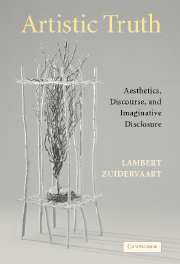3 - Kant Revisited
Published online by Cambridge University Press: 13 July 2009
Summary
The beautiful is the symbol of the morally good, and … only in this respect … does it please with a claim to the assent of everyone else.
Immanuel KantTo examine connections among language, art, and aesthetic validity, one must revisit Kant: the roots to contemporary debates about artistic truth lie in Kant's aesthetics. Kant recognizes that validity encompasses more than propositional truth. He considers validity to be multidimensional. In distinguishing aesthetic validity (“beauty”) from epistemic validity (“truth”) and moral validity (“goodness” or “rightness”), however, Kant gives an ambiguous account. On the one hand, he demarcates an unusual zone of experience and activity where imaginative cognition and creative conduct can occur. He emphasizes an irreducible dimension of valid aesthetic judgment and, by extension, of aesthetic experience and aesthetic objects. And he defines the fine arts with reference to this dimension, as those areas of production and reception in which “aesthetic ideas” and “taste” prevail. On the other hand, Kant's descriptions of this zone untether it from his usual anchors of validity, namely, intellectual concepts and rational ideas. Hence aesthetic experience and activity, as aesthetic, are neither theoretical nor practical and are not fully constituted in a Kantian sense. His account of the subjective universality and exemplary necessity of taste judgments reflects this untethering, as does his account of the beautiful as purposiveness without purpose.
- Type
- Chapter
- Information
- Artistic TruthAesthetics, Discourse, and Imaginative Disclosure, pp. 55 - 74Publisher: Cambridge University PressPrint publication year: 2004



